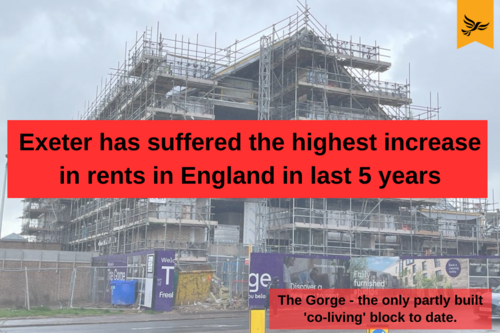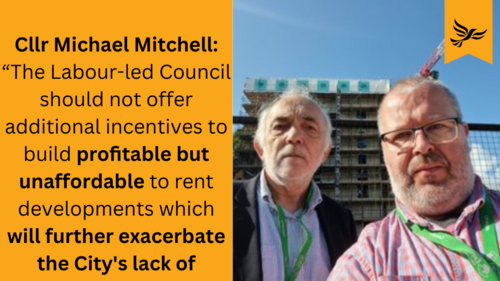
Exeter has suffered the highest rent increase in England in the last 5 years
Exeter has suffered the highest rent increase in England in the last 5 years, up 39%. Will Exeter Labour blame the Tories for this too? At the same...

Councillors call for Developers to pay their way through the Community Infrastructure Levy, to help create a fairer greener city
Progressive Group Councillors on Exeter City Council say that proposed changes to the Community Infrastructure Levy (CIL), which the Council is currently consulting on, will fail to make the city a fairer and greener place to live.
CIL is a charge levied by councils on new developments which is then used to help fund vital infrastructure in the area. However, the group of Green, Liberal Democrat and Independent councillors are concerned that blocks of flats will not contribute at all to the infrastructure necessary to support their development.
The Progressive Group also wants to see "co-living" developments charged the same CIL rate as Purpose Built Student Accommodation (PBSA). The Labour-led City Council is currently proposing a CIL rate of £150 p/msq for Student Accommodation blocks but only £50 p/msq for similar co-living developments. They say lower CIL rates should be offered to developers who can demonstrate the development will be a ‘net zero' development.
Green Party councillor Diana Moore said:
“CIL is an important contribution by developers to help fund vital city infrastructure like community centres, parks, cycle paths and bridges.
“All developers should pay their way, especially as it is expected that there will be many new flats built as a result of the new local plan. And by offering lower rates to developers who build net zero homes we can see new homes that are more affordable to live in and reduce carbon emissions. This is the way to use CIL to help create a fairer, greener city.”
Liberal Democrat councillor Mike Mitchell said:
“Co-living developments are student accommodation in all but name. As such, a lower CIL rate for co-living developments cannot be justified. The previous discounted CIL rate for Purpose Built Student Accommodation has led to a proliferation of student accommodation in Exeter city centre. We cannot repeat that mistake by incentivising the building of co-living developments. Especially since co-living bedsits fail to meet minimum space requirements, and at a cost of over £1000 a month to rent, cannot be considered affordable accommodation.
“The Labour-led Council should not offer additional incentives to build profitable but unaffordable to rent developments which will further exacerbate the City's lack of affordable housing.”
Green councillor Carol Bennett concluded:
“We need mixed housing, affordable housing, and housing built to net zero standards. We also need to create communities that can rely on walking, cycling and other active travel or public transport to access jobs, shops and leisure. The charges made to developers are crucial to move us in that direction.”
Notes